Hi, I’m Annie! In 2014 I started making natural handmade soap and decided that I never wanted to stop. Soapmaking is the perfect combination of science (I’m a biologist by trade) and art and I love it. I also have–or had–problematic skin, which made me rethink the products I was putting on my body. I tried natural handmade soap and quickly saw improvements in my skin, but I had a hard time finding local soap that had all the qualities that were important to me.
I’ve always been a DIY-er, so I just decided to make my own! The new hobby quickly became a passion and Triangle Soap Co. was born. Based in Mebane, NC, Triangle Soap Co. incorporates high quality oils with only plant-based colorants and essential oils–none of those artificial colors and fragrances. We want to provide the community with natural handmade soap and to be a resource for knowledge about their personal care products.
Here are 6 reasons to use natural handmade soap:
1. Natural handmade soap cleans skin as well as commercial “soap”
Is your “soap” you buy at the store actually a soap? Ever wonder why the labels say, “face wash,” “body wash,” “dish detergent,” or “cleansing bar” instead of soap? The answer lies in the definitions of these terms and FDA regulations. Strictly speaking, soap is the alkali salt of fatty acids and the ONLY cleaning agent in “soap” is soap. Oils and lye go into the pot, and, through a reaction called saponification, soap comes out. Products that contain other cleaning agents, such as synthetic detergents, cannot be called soap under these regulations. Detergents and soap clean in similar ways: molecules surround dirt and oils, allowing these contaminants to be rinsed away by water. Additional chemicals can help break down and react with contaminants, which is great for cleaning surfaces but completely unnecessary for everyday skin cleaning.
What about antibacterial soaps? Do they clean better than handmade soap? In September of 2016, the FDA released a statement declaring that there is no scientific evidence showing that antibacterial soap is better than plain soap at stopping the spread of bacteria and viruses. You can read the entire article here.
2. Commercial soap can have questionable ingredients
The FDA report also states that manufacturing companies were unable to produce the data required to prove the safety of the antibacterial ingredients. This ultimately led to the FDA requiring manufacturers to remove these chemicals from their products.
But isn’t soap made with a caustic chemical? Yes, lye or potash is used in the chemical reaction to convert oils into soap and can cause chemical burns when the raw form comes into direct contact with exposed skin. The original source of lye used in soapmaking was wood ash, though now it is commercially available in a purified form. But if the soap is made correctly all of the lye is consumed in the reaction, leaving only soap, glycerin, and sometimes excess oil. In truth, I formulate all my recipes with excess oil both for skin benefits and to ensure that my reactions will run out of lye before they run out of oil.
Talk with your soapmaker. Ask them how they develop their recipes, where they get their ingredients, and how they test their products for safety. If they can’t answer all of these questions or point you in the direction of someone who can, find another soapmaker. If you have sensitive skin, ask to purchase a sample or test bar to ensure it is safe for your skin.
3. Natural handmade soap has lower environmental impact
How many plastic face/body/hand wash bottles do you dispose of in a single year? Even if you recycle them, how much energy do you think it takes to turn that plastic bottle into another plastic product? Many handmade bar soaps need only a paper label to be sold. If you’re buying multiple bars for personal use, ask your soapmaker if they will sell you “naked” soap–that is, soap without excess packaging. If your soapmaker uses shrinkwrap or other plastic packaging products, ask if they would consider switching to a more biodegradable and earth-friendly approach. Many soapmakers appreciate customer feedback and like to know which values are important to their customers.
What about the cleaner itself? Since soap is essentially a salt of plant or animal oils, they typically have minimal impact on water supplies and ecosystems. Synthetic detergents, however, frequently contain petrochemicals and phosphates. An excess of phosphates in the waterways promotes the overgrowth of algae, which can cause oxygen depletion and fishkills.
4. The cost is comparable
Some consumers are deterred by the cost of handmade soap. But if one bar of soap can replace both your face and body wash, is it really more expensive? Do you find that your face wash dries out your skin and now you have to use a daily moisturizer? Give a bar of handmade soap a try and compare how long it lasts in the shower and how your skin feels compared to your usual skincare routine.
5. You support small businesses in your community
If you’re reading this blog I probably don’t have to convince you that shopping local is important. Small businesses are an important part of the local economy and purchasing from soapmakers in your area reduces the environmental impact of international shipping.
But how do you find a local soapmaker to support? Check nearby farmers markets and boutiques for local products. Ask other local vendors and farms. Search on Google and Facebook for nearby businesses. Worst-case scenario, many soapmakers offer their goods for sale on Etsy or their own website.
- You can make natural handmade soap yourself!
Feeling crafty and want to give soapmaking a shot? Everyone starts somewhere. The biggest concern is handling lye, a caustic substance that can cause chemical burns if it comes into contact with your skin. If you feel confident in your ability to safely handle chemicals, you should give soapmaking a try.
Proper lye handling starts with the right gear. Whenever handling lye, wear long sleeves, safety glasses, and gloves. Have a bottle of vinegar nearby to neutralize any lye that ends up outside of the container. Lye should be mixed only in glass, high-density plastic, or stainless steel (DO NOT USE aluminum or ceramic). When lye mixes with water, it heats up and releases fumes, so mix your lye outside in a well-ventilated area on top of a heat-safe surface.
The internet has a wealth of recipes and resources on how to make soap, so be sure to do a lot of research. Your first step should be selecting a recipe and running it through a lye calculator to ensure the proportions are correct. I use SoapCalc, but others are available. Even “tried and true” recipes can be adulterated if a decimal is moved or something is typed incorrectly, so I can’t overstate the importance of this.
Most soapmaking supplies can be purchased at local grocery and big box stores if you’re just starting out. If you’re making a large amount or having trouble finding high-quality materials in your area, the internet is your friend. There are dozens of websites dedicated to soapmaking supplies–my favorite is Bulk Apothecary. Their customer service is top-notch and their prices and quality are some of the best I’ve found!
Have you tried natural handmade soap? Have you made it yourself? Let us know in the comments!
Warmly,
Annie.
Annie Seifts
Author

Annie, founder of Triangle Soap Co., is a talented soapmaker, biologist, gardener, and lifelong DIYer from Mebane, North Carolina. We are hooked on her handmade soaps and lotions and are excited for you to discover this sweet soul and her passion for soapmaking!
By commenting you accept our Privacy Policy.
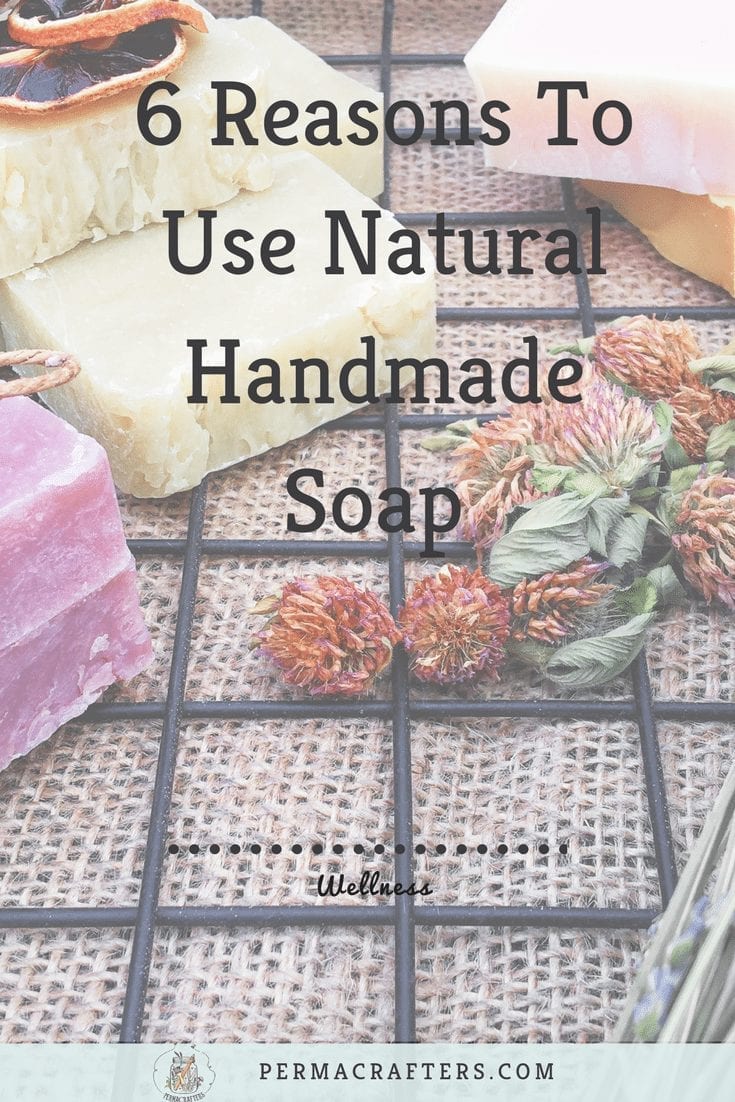
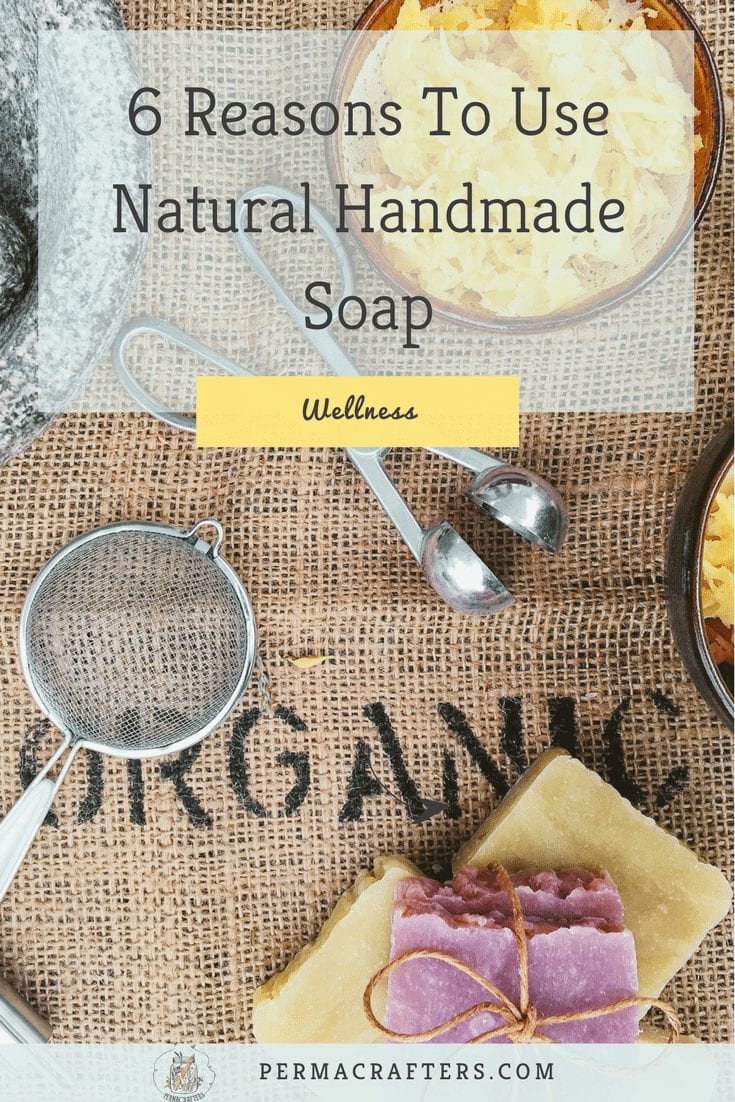
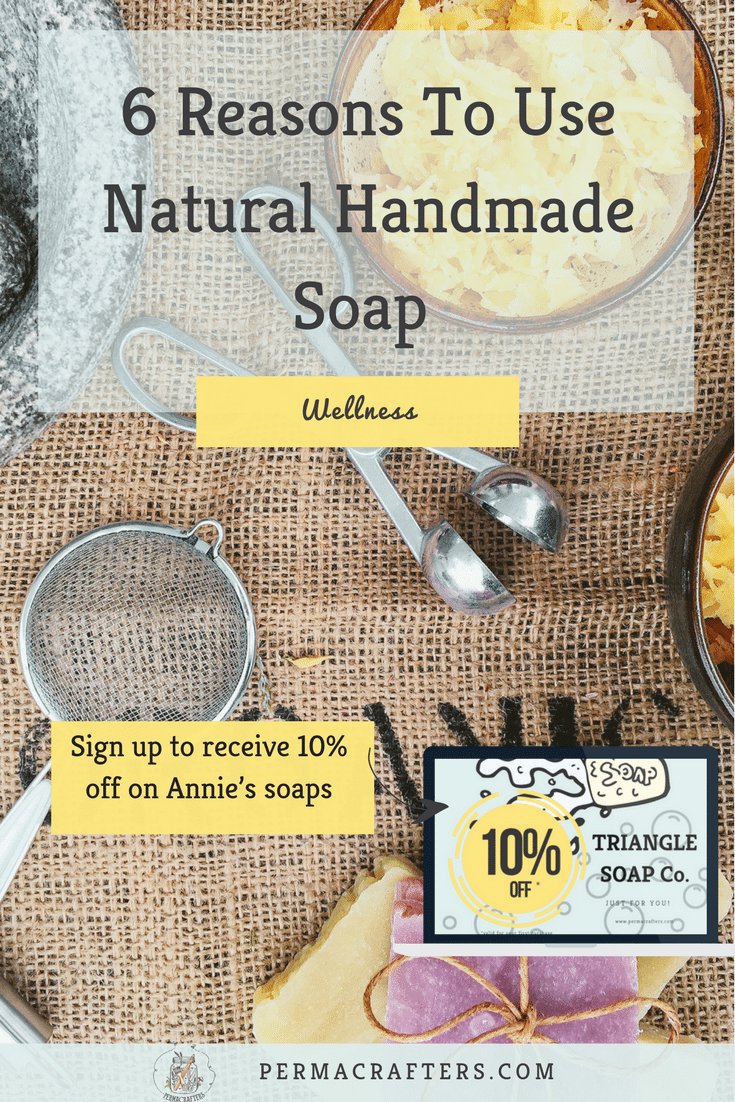
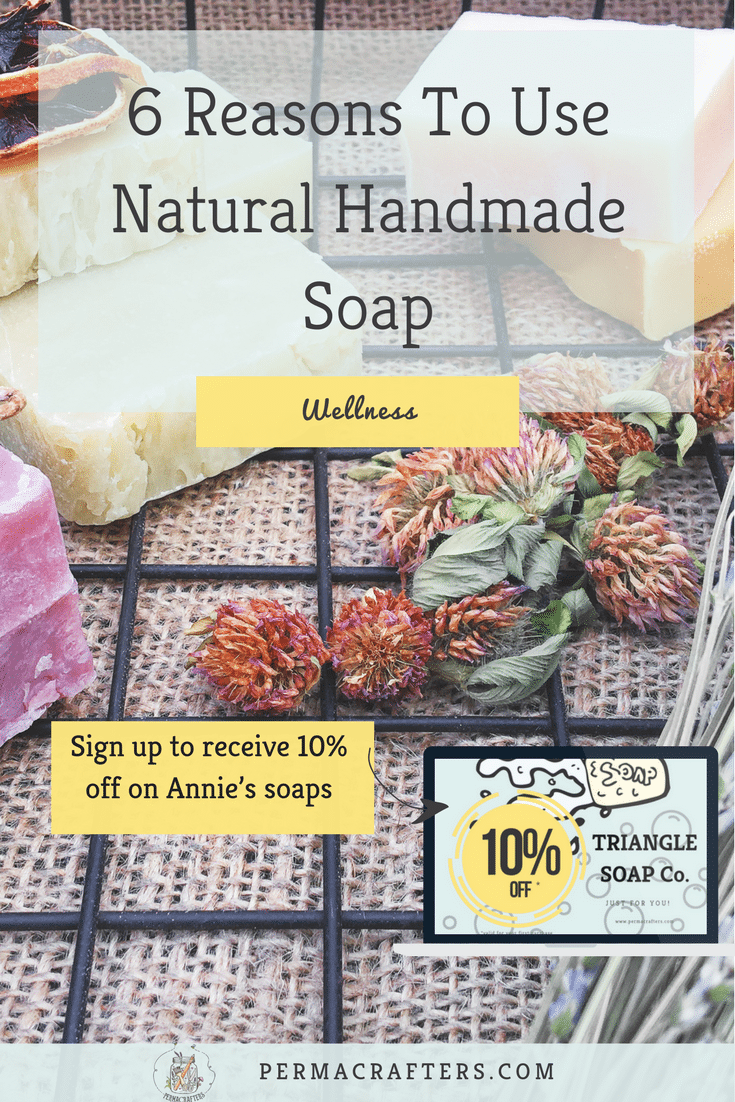
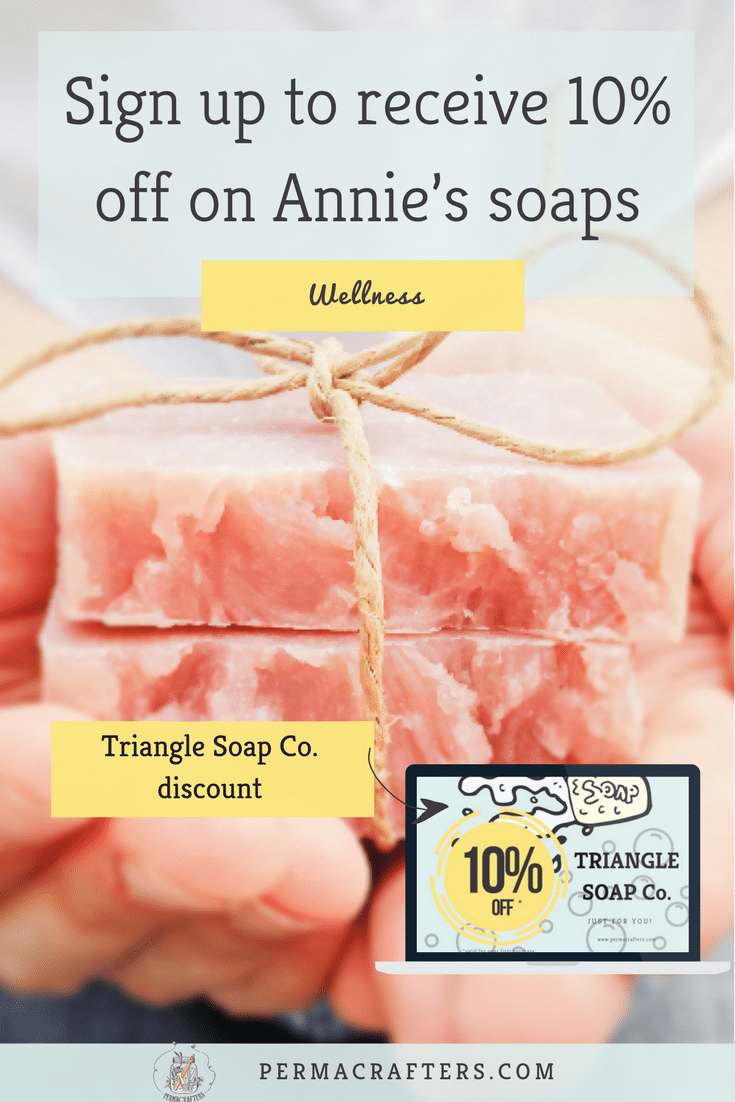
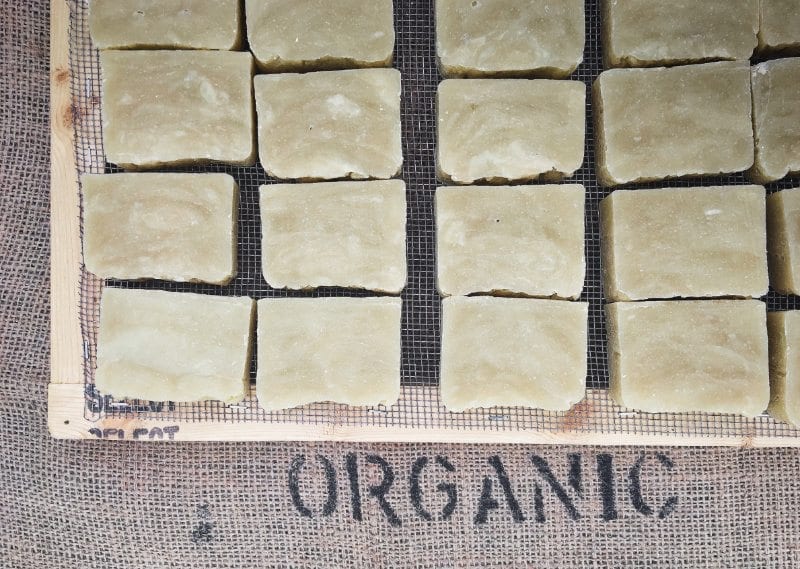
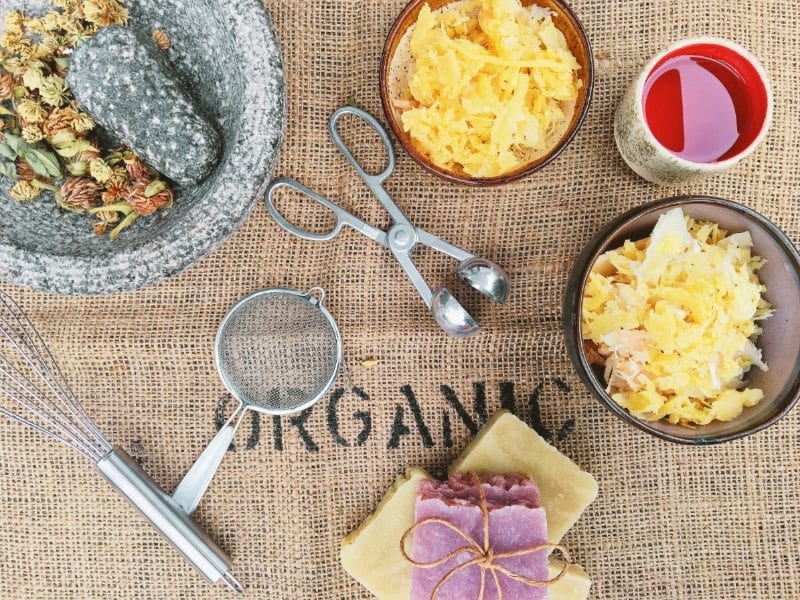
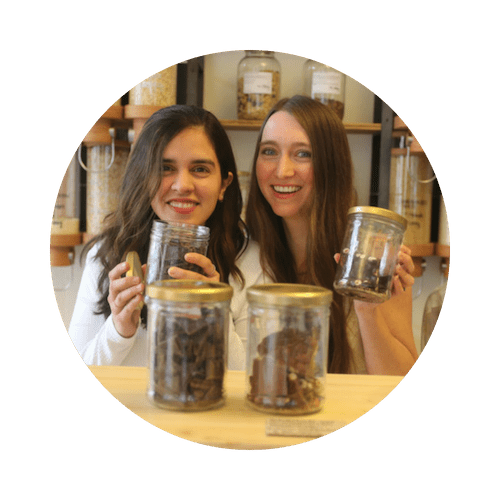
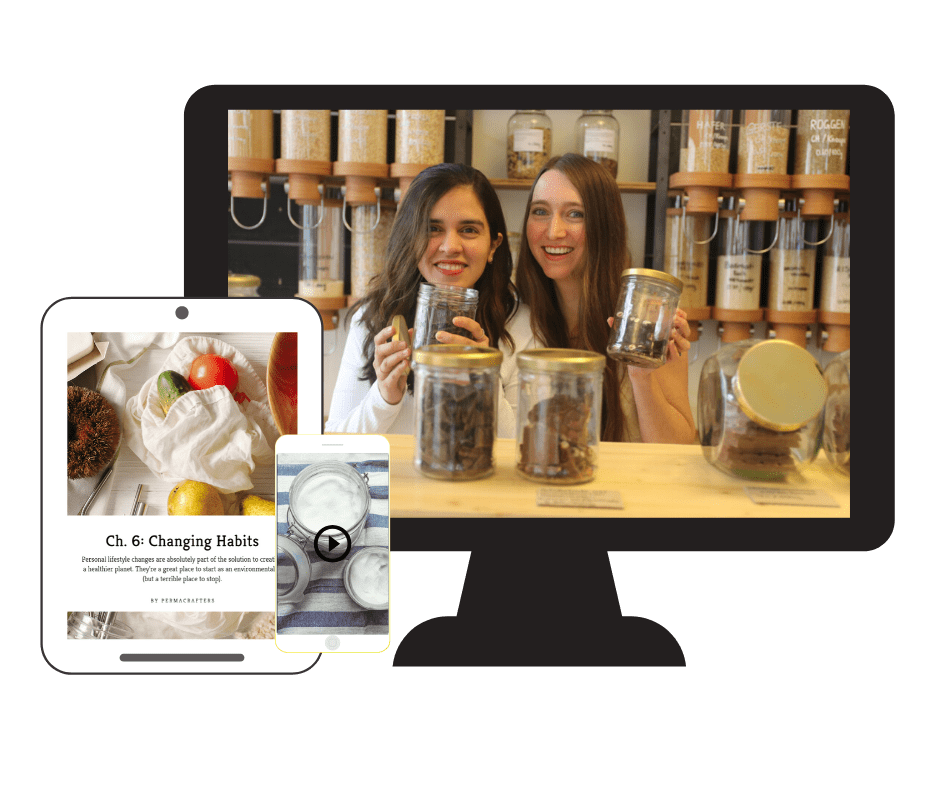
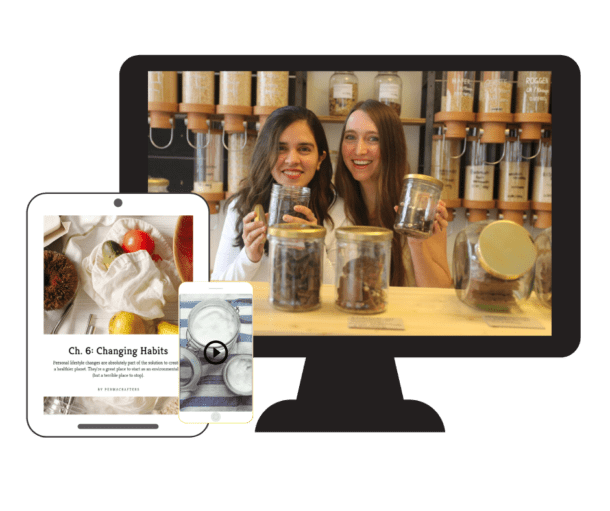
I have used Annie’s soap and lotions for several years. I will never go back to using commercial detergents. Her products are working wonderfully on my skin (I think they have saved my feet). The newest product I got from Annie is her natural luffa. She grows them!
Yes we love Annie’s luffa!! She was growing SO many last season – they were beautiful. Cristina was so crazy about them, she decided to grow some this year!
You bring up a good point that buying natural soap helps to reduce environmental impact. I am trying to be more eco-conscious in my purchases and think this would be a great option to consider. It would be smart to find a natural soap supplier in my area where I can get more natural products like this.
Hi Greta! Have you tried farmers’ markets, coops, or local stores? They usually have natural soap made by local soapmakers. In Durham NC, we know about Fillarree, a local soapmaker. You also mind finding good online options for soaps at Package Free Shop.